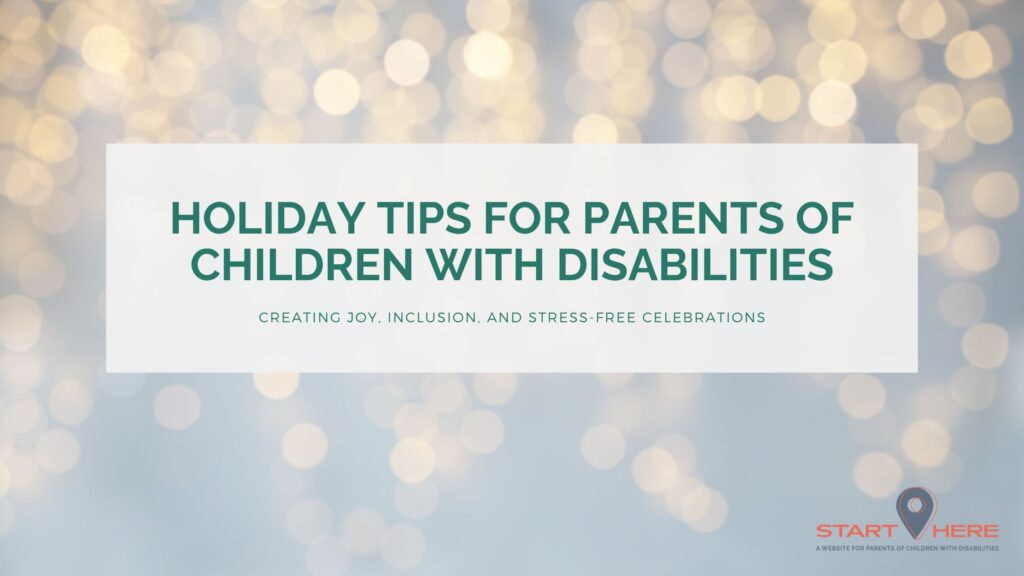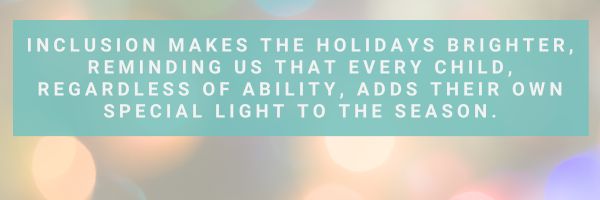
Navigating the holiday season can be a whirlwind of excitement, but it often comes with its own set of challenges—especially for parents of children with disabilities. With so many obligations to meet, family gatherings to plan, and changes to the daily routine, it’s easy to feel overwhelmed. The festive atmosphere, while joyful, can also bring additional stress, making it difficult to create an enjoyable experience for everyone involved.
For families with children who have disabilities, the typical holiday hustle can amplify feelings of anxiety and uncertainty. Each child has unique needs that may not align with traditional holiday activities, leading to potential discomfort in new environments. The pressure to meet family expectations can add to the stress, leaving parents feeling isolated or unsure of how to navigate these situations.
We understand these challenges, and we’re here to help! Throughout this holiday season, we’ll be sharing tips and suggestions tailored specifically for parents of children with disabilities. Our goal is to provide resources and insights that can help make this time as enjoyable and stress-free as possible for you and your kids. From planning inclusive activities to managing sensory sensitivities, we’ll cover a range of topics to support your family’s unique needs. Together, we can create meaningful holiday experiences that celebrate joy, love, and connection.

Some topics you will find below:
- Helping children manage stress during the holidays
- Inclusive holiday activity suggestions, with adaptations, for the holiday season
- Links to other holiday-related resources to support children with disabilities during holiday time
Helping children with disabilities manage stress during the holidays (and generally):
- Establish a Routine: Maintain as much of your child’s regular routine as possible. Predictability can provide comfort, so incorporate familiar activities amidst the holiday hustle.
- Prepare in Advance: Talk about upcoming events and activities in advance. Use visual schedules or calendars to help your child understand what to expect, reducing anxiety about surprises.
- Create a Calm Space: Designate a quiet area where your child can retreat if they feel overwhelmed. Having a safe space can help them regulate their emotions and recharge.
- Incorporate Sensory-Friendly Activities: Consider your child’s sensory preferences when planning activities. opt for quieter, less stimulating environments, and incorporate sensory-friendly tools like fidget toys or noise-canceling headphones.
- Limit Overwhelm: Scale back on commitments and avoid back-to-back events. Prioritize a few key activities that your child enjoys, allowing for downtime in between.
- Practice Mindfulness: Introduce simple mindfulness techniques, such as deep breathing exercises or gentle stretching, to help your child center themselves during stressful moments.
- Encourage Expression: Provide opportunities for your child to express their feelings about the holidays. Use art, storytelling, or role-playing to help them articulate any concerns or excitement.
- Be Flexible: Be ready to adapt plans based on your child’s needs. If they show signs of distress, it’s okay to leave an event early or skip an activity altogether.
- Involve Them in Planning: Give your child a voice in holiday planning. Let them help choose activities, decorations, or treats, fostering a sense of ownership and excitement.
- Focus on Connection: Emphasize the importance of spending quality time together. Create low-pressure activities, like baking cookies or watching holiday movies, to strengthen family bonds in a relaxed setting.
Hopefully some of these adjustments can help create a less stressful holiday experience for your family!
__
The below list of holiday activities for children with disabilities is designed to be inclusive, adaptable, and enjoyable for kids of all abilities. Each activity has suggestions for how it can be tailored to suit the individual needs of your child, ensuring they can participate in experiencing the seasonal joy.

Here’s a list of fun and inclusive holiday activities for children with disabilities:
Holiday Crafting
- Adaptation: Use large, easy-to-grip tools or adaptive scissors for fine motor challenges.
- Activities: Decorating ornaments, making holiday cards, or creating paper snowflakes.
Sensory Play
- Adaptation: Focus on activities with different textures, sounds, or lights, ideal for sensory sensitivities.
- Activities: Make sensory bins with holiday themes (like fake snow or bells), play with holiday-themed slime, or use scented playdough (gingerbread, cinnamon).
Baking Holiday Treats
- Adaptation: Use adaptive kitchen tools or assist with pouring and stirring. Pre-measure ingredients for easier involvement.
- Activities: Baking cookies, decorating cupcakes, or making hot chocolate with marshmallows.
Accessible Nature Walks/Outdoor Adventures
- Adaptation: Choose wheelchair-accessible trails or bring mobility aids for outdoor exploration.
- Activities: Look for holiday lights, collect leaves and pinecones for crafts, or enjoy nature while dressed in holiday attire.
Holiday Movie Marathon
- Adaptation: Use subtitles, audio descriptions, or modified seating for comfort.
- Activities: Watch holiday classics, create a cozy area with blankets and pillows, and provide themed snacks.
Storytime with Holiday Books
- Adaptation: Use interactive or sensory books, or listen to audiobooks for children who are visually impaired or have other reading difficulties.
- Activities: Read aloud holiday stories, act out the characters, or listen together as a group.
Music and Carol Singing
- Adaptation: Use assistive communication devices or simple instruments (like bells or tambourines) to engage in the music.
- Activities: Sing holiday songs, create a homemade band, or attend an inclusive holiday concert.
Adapted Holiday Games
- Adaptation: Modify traditional games to suit a child’s needs, such as using larger pieces or simplifying rules.
- Activities: Holiday-themed bingo, pin the nose on the reindeer, or musical chairs with festive music.
Virtual Santa Visit
- Adaptation: For children with mobility or sensory concerns, consider a virtual visit with Santa where they can interact from the comfort of home.
- Activities: Virtual meet-and-greet with Santa, write and send an email or letter to Santa.
Inclusive Holiday Party
- Adaptation: Ensure the venue is accessible, with sensory-friendly spaces and activities.
- Activities: Host a small gathering with holiday-themed music, crafts, and accessible games. Offer quiet zones for children who may need a sensory break.
Holiday Light Display Tour
- Adaptation: Take a driving tour through neighborhoods with holiday lights, or attend an accessible, low-stimulation light show.
- Activities: Point out favorite decorations, take photos, or create a scavenger hunt for specific lights.
Building Gingerbread Houses
- Adaptation: Preassemble houses for children with fine motor challenges, or use large edible pieces that are easier to handle.
- Activities: Decorate houses with candy, icing, and edible glitter, or build houses out of graham crackers for easier assembly.
Holiday Sensory Bottles
- Adaptation: Create sensory bottles with water, glitter, and small holiday-themed items (like mini trees or bells).
- Activities: Use the sensory bottles to create a calming or engaging activity.
Charity Activities
- Adaptation: Choose charities or events that are inclusive of children with disabilities.
- Activities: Pack gifts for a holiday donation drive, make cards for nursing home residents, or bake cookies for a community event.
These activities can be easily modified to fit various needs and ensure an inclusive holiday experience for all children.
We compiled resources from various organizations that provide tips and strategies for parents of children with disabilities during the holiday season. These resources aim to help families navigate the unique challenges that arise during this time, offering advice on how to create inclusive, stress-free celebrations that meet the needs of all family members.
Additional Resources:
Understood – Holiday Planning Tips
Autism Speaks- Tips for a Sensory-Friendly Holiday
The Mighty – How to Navigate the Holidays
Special Needs Parent Coach – Holiday Survival Guide
Cerebral Palsy Foundation- Making the Most of the Holidays
National Association of School Psychologists – Coping with Holiday Stress
Feel free to check these out for practical advice and support!

